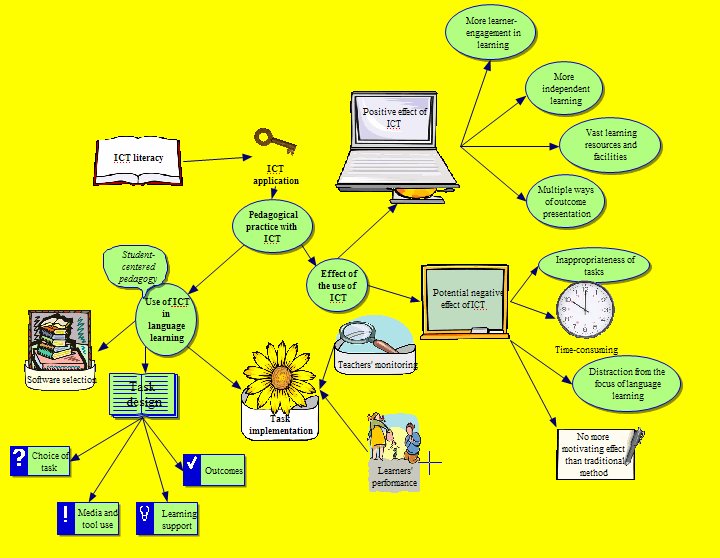My curiosity about the use of ICT:
“ICT usage in schools will foster the development of skills and attitudes and increase students’ learning abilities…” (Towndrow, 2007, p. 9). The use of ICT in language learning emphasizes student-centeredness. Therefore, in designing learning tasks integrated with ICT, teachers should always keep in mind that it is critical to provide learners with the opportunity to interact for negotiation of meaning. Good software may promote the learners’ performance, but how teachers design the tasks is critical to the success of the pedagogical practice with ICT. Then, my biggest curiosity about the use of ICT is how to integrate it in a learning task and what kind of activity is assessed as good CALL (computer-assisted language learning) activity.
A response to my curiosity offered by this class:
From Towndrow’s (2007) introduction to task design and task assessment, as well as from Chapelle’s (2001) evaluation criteria of CALL, I get the idea that when designing a task, the teachers should choose the task that is appropriate for particular learners in a particular context at a given time, and both teachers’ and learners’ roles should be taken into consideration all the time. Whether the incorporation of ICT into a particular lesson can add variety, interaction, flexibility and individuality is also important. In this process, whether it is the teachers’ responsibility or whether it is the learners’ freedom to decide when ICT is used and which tools are used may have different effect on the success of CALL classes. Also, during this process, whether the learners get predetermined and fixed learning support or flexible and contextual learning support from the teachers also influence the success of the tasks. What kind of learning outcomes are expected or whether the expected outcomes are obtained are also one of the evaluation criteria of the success of the tasks.
Argument for and against the use of ICT:
There are surely many supporting ideas for the positive effect of the use of ICT, like a way to motivate learners in language learning, or a way to provide learners with freedom to use language. The use of ICT can provide learners with vast learning resources and facilities and can offer learners multiply way to present the learning outcomes. All these advantages ensure a higher degree of learners’ independent learning. However, there is also a risk that language learning depends so much on the use of ICT. ICT should not constrain people’s creativity but should provide a resource of thinking. ICT should perform an assisting function rather than a mastering function. Some teachers are not capable of designing appropriate tasks. In implementing learning tasks, some learners may feel incompetent at using technology and feel more time-consuming than with traditional teacher-instruction method. Sometimes, when they are struggling to deal with the technology, they may ignore the focus of language learning.
Questions formulated based on the argument:
Inspired by the argument, at least two questions can be asked considering the design of ICT-based classes:
What kind of tasks should involve the use of ICT?
When should teachers incorporate ICT into their classes, in what way and to what extent?
Personal plan:
“The job of English language teachers in contemporary learning contexts is to assist each one of their learners to acquire the necessary language, communication skills and strategies needed to learn ‘with’ technology effectively.” (Towndrow, 2007, p. 31)
The goal of each class is critical for teachers to decide whether to incorporate ICT into learning tasks. If the goal of a task is to assist learners to develop some practical skills, like writing and speaking, which need more interaction and flexibility of learning, no fixed way of thinking is required, then the incorporation of ICT is kind of facilitating. Of course, in order to exert the function of ICT to the largest extent, it is desirable to train both the teachers and the learners how to use particular facilities or resources before the start of focusing on language development.
Although ICT can assist and facilitate language learning, it does not mean that language learning will not develop without the use of ICT. Overdependence on ICT will also bring negative effect on language learning. For this reason, teachers should carefully select the type and time for ICT application. Some teachers are fond of exposing various types of technology and information to learners, with little effort to explain how to combine the use of ICT with language focus, indulging the learners in an infertile action of self-struggling. In order to avoid this result, teachers should cautiously decide the time of using a new technology or introducing new information, with necessary explanation and purposeful goal of language outcomes.
Friday, April 11, 2008
Subscribe to:
Comments (Atom)
